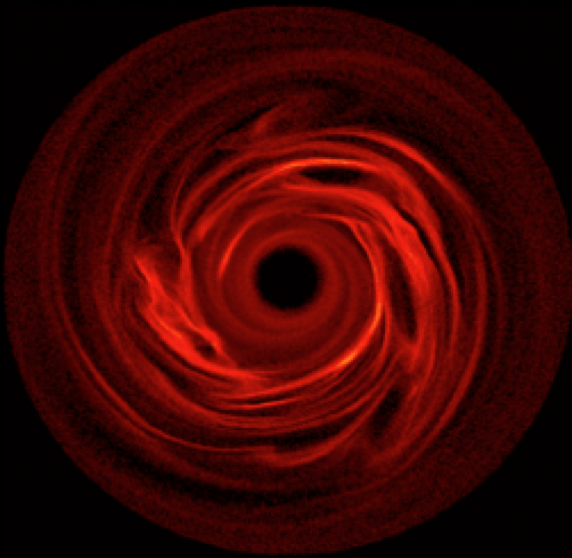No Planets Needed: NCCS-Hosted Simulations Show Disk Patterns Can Self-Generate
NASA Goddard Space Flight Center (GSFC), Penn State, and California State University, Northridge/NASA Jet Propulsion Laboratory astrophysicists used the NASA Center for Climate Simulation (NCCS) Discover supercomputer to simulate gas-dust interactions in disks (debris and transitional) around young stars.They ran nine simulations, each varying the amount of gas and dust—key variables in determining factors such as how much drag force the dust particles will experience and how much the dust heats the gas. Each 400,000-year simulation used 84 cores on Discover, where the researchers also partly assembled visualizations. Total computation time was just under 300,000 core-hours.
Dust patterns seen in these disks are often attributed to the gravitational influence of unseen planets, but the simulation results suggest that these patterns may emerge from the gas-dust interactions without any planet present.

New simulations performed on the NCCS Discover supercomputer show
how dust and gas in a circumstellar disk could form patterns
without planets. Visualization by Marc Kuchner, GSFC.
“We would not have been able to explore such a wide parameter space in a reasonable amount of time without NASA’s supercomputing resources,” said Marc Kuchner, astrophysicist in GSFC’s Exoplanets and Stellar Astrophysics Laboratory. “Using the Discover cluster enabled us to explore the effects of varying dust and gas levels, as opposed to producing just one or two simpler simulations that would only have allowed us to show qualitative results.”
Kuchner presented the results on January 11, 2018 at the American Astronomical Society meeting in Washington.
More Information
No Planets Needed: NASA Study Shows Disk Patterns Can Self-Generate
Richert, A.J.W., W. Lyra, and M. Kuchner, 2018: The Interplay Between Radiation Pressure and the Photoelectric Instability in Optically Thin Disks of Gas and Dust. The Astrophysical Journal, 856, 41, doi:10.3847/1538-4357/aaadaa.


